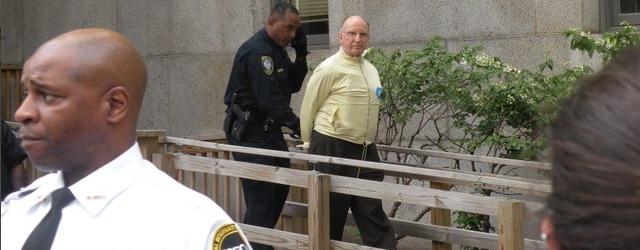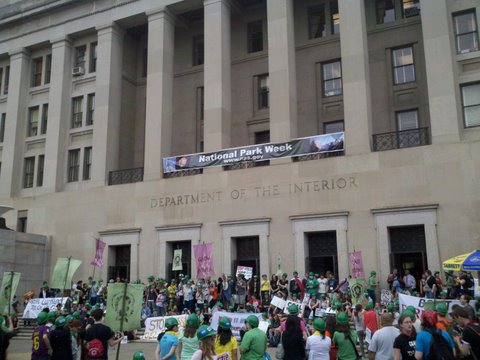Guest post by Travis Lyons
His name is Donald Wheeler–he’s 76 years old, a retired professor from New Jersey, and my friend. He’s about as far as possible from the severe, humorless academic I expected when I heard we’d be rooming together for the PowerShift 2011 conference for environmental organizers in Washington, DC. When we first met he slapped me on the shoulder and cried “Hey, man–how are ya?!” with one of the warmest, most open grins I’ve ever seen on a person’s face. It would be easier to find an underpaid Yankees starter than to dislike this man, who happily roomed with three twenty-somethings and a forty-six year old in order to attend.
Two days ago I watched as a Homeland Security officer escorted him in flex-cuffs to a police wagon idling outside the US Department of the Interior. Don is one of twenty-one people who remained in the building after being warned three times that they faced arrest and possible felony charges for entering and occupying the DOI building on April 18, 2011. I’d noticed that he wasn’t among the hundreds of people chanting, singing and dancing outside the building–considering his age and how far we’d been marching, I thought maybe he left after we arrived.
Two of my other conference roommates–Alex Lyakhov and Dana Patterson–were outside the building with me. When Don came out, head held high and looking for all the world like he was being escorted to his car by a valet, Alex and I whipped around so quickly to share an astonished stare that I think we actually broke the sound barrier. A moment later I got a text from Dana; it read merely “No fucking way.”
As each person was escorted from the building the crowd began to chant “Thank you!” over and over again. Don came within a foot of Alex and I as we shouted “Thank you, Don!” like a couple of madmen; when he caught sight of us he smiled like we were old friends running into each other at a coffee shop. “Hey guys!” he said, and then “No, no, thank you! Thank you!” He wasn’t the only one to come out happy–some were smiling, some were singing, some were stoic, but none of those twenty-one arrestees looked like they felt anything but satisfied that they were doing the right thing.
We were there–nearly a thousand of us, by some estimates–to demonstrate against the Interior’s continued authorization of mountaintop removal coal mining in this country. For those who haven’t heard of it, this is a process in which a mining company literally blows the top off of a mountain to get at the coal underneath. The coal companies refer to anything on top of the coal–things like soil, rock, and habitats that evolved over millions of years–as “overburden,” and once it’s been blown up and the coal extracted, the rubble is swept into an approximation of the mountain’s original shape. Anything that doesn’t fit is dumped into nearby river basins. Many living in the Appalachians had great- and great-great-grandparents who settled in the mountains and grew up teaching their children about them; they’re now forced to live drinking contaminated water, breathing dust-, toxin- and coal-particle-laden air as layers of sulfuric dust corrode their homes. The mortality rate has gone higher and higher in Appalachia, and rates of cancer and heart, liver and kidney disease have increased with it. For the sake of energy production, this has been allowed.
This weekend I met people from Appalachia, whose homes are being destroyed and whose family legacies are buried under tons of rock; I met people from the Gulf Coast, whose way of life has been sacrificed in the name of increased energy production and who have yet to receive justice from the government; I met people from the Black Mesa Indian reservations, whose water was taken for use in a coal slurry pipeline; I met people from Alberta, Canada, who’ve seen whole tracts of land razed and burned for the sake of tar sands extraction. As long as we live in a system where such things are deemed necessary for the sake of our own comfort, there is nothing preventing them from happening to us, as well.
The world will not change for the better if we merely switch out fossil fuels for renewable energy–perhaps it would mitigate climate change, perhaps it would rescue our species, but if one exploitative infrastructure is swapped for another we will have saved nothing. What happened on Monday was about standing up and telling those who have deemed our neighbors expendable that we are not consumers–we are not voters–we are not even constituents. We are human beings: people with families, with histories, with lives and loves and memories stretching back generations, and we are every one of us victims when those who live beside us are dubbed expendable. As long as the lowest among us have no voice, then none of us do, and if one person’s freedom is considered a necessary sacrifice, none in this nation can truly call her- or himself free.
Victor Hugo’s Les Miserables begins when the convict Jean Valjean steals silver from the home of a man who gave him shelter after his release. When the police return Valjean to the man’s house with the silver, the man smiles and tells them he’d given it to Valjean as a gift before he left, and that in fact Valjean had forgotten to take two silver candlesticks, as well. As this means no crime has been committed, Valjean is set free, and the man tells him that by accepting the silver he is promising to make an honest man of himself. The rest of the novel sees Valjean living his life in an attempt to earn to that man’s kindness, which he does not understand, though they never see one another again.
On Monday a 76-year-old man named Donald Wheeler sat down in the US Department of Interior and stayed until the police came to arrest him. As he passed by the other demonstrators, smiling and laughing like he always did on his way to the police wagon, a thousand silver candlesticks were passed around the crowd, and we were told to make honest men and women of ourselves. If we are to create a just an equitable world–a world where none are deemed expendable for the sake of others’ comfort and convenience–we must live up to the example that he and twenty others set for us.
If we are to prevail in this struggle–if we are to build that just, equitable world out of the competitive and destructive one we have now–many more will have to join those arrested at the Department of Interior. Many more will have to stand up and be counted and say that we are the Applachians, the Gulf Coast dwellers, the Albertans. It will not be easy, but if there’s one thing I learned this weekend it is that none of us will have to do it alone. No sooner had the police wagons driven off than was a hat passed around to collect money for the arrestees’ legal fees; no more than five minutes after we discovered the jail to which they’d been taken did a crowd head over to welcome them upon their release.
“We support the resisters,” went one of the crowd’s chants, “they’re our brothers and our sisters.” As Don walked past me–as Alex and I slung arms around each other’s shoulders and raised our fists into the air–as Dana and I chanted together until our lungs were sore and we were doubled over panting and laughing–I understood the truth in those words. Three days before we had all been strangers. Today we looked at each other and felt love. And if that is possible for people at a three day conference, it is possible for anyone. We are past the point in this world where hatred and alienation and winner-take-all competitiveness can do anything but harm us as a society. Perhaps it is too late to save ourselves from climate change–I truly do not know. But I know that to me, it no longer matters. I’ve realized that this fight has never been about preventing our own deaths. It is about learning to die with dignity.
Travis Lyons is an Irish-American writer who attended Powershift 2011


Leave a Reply